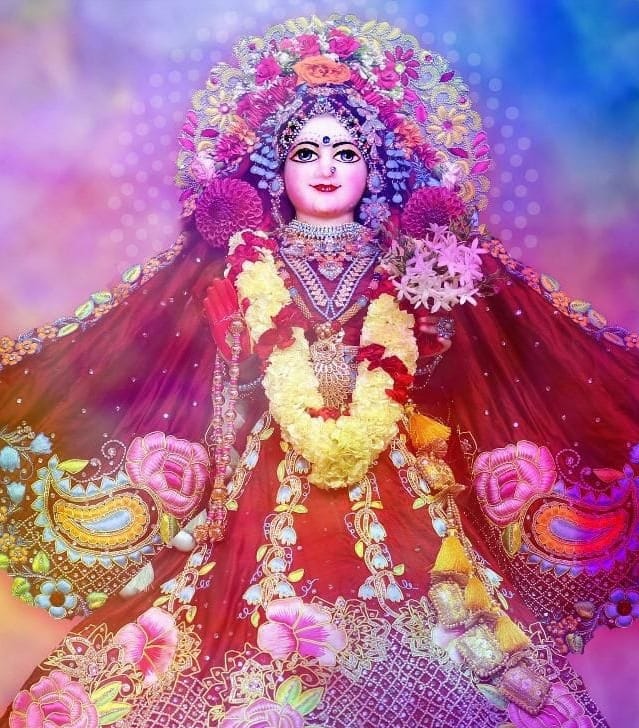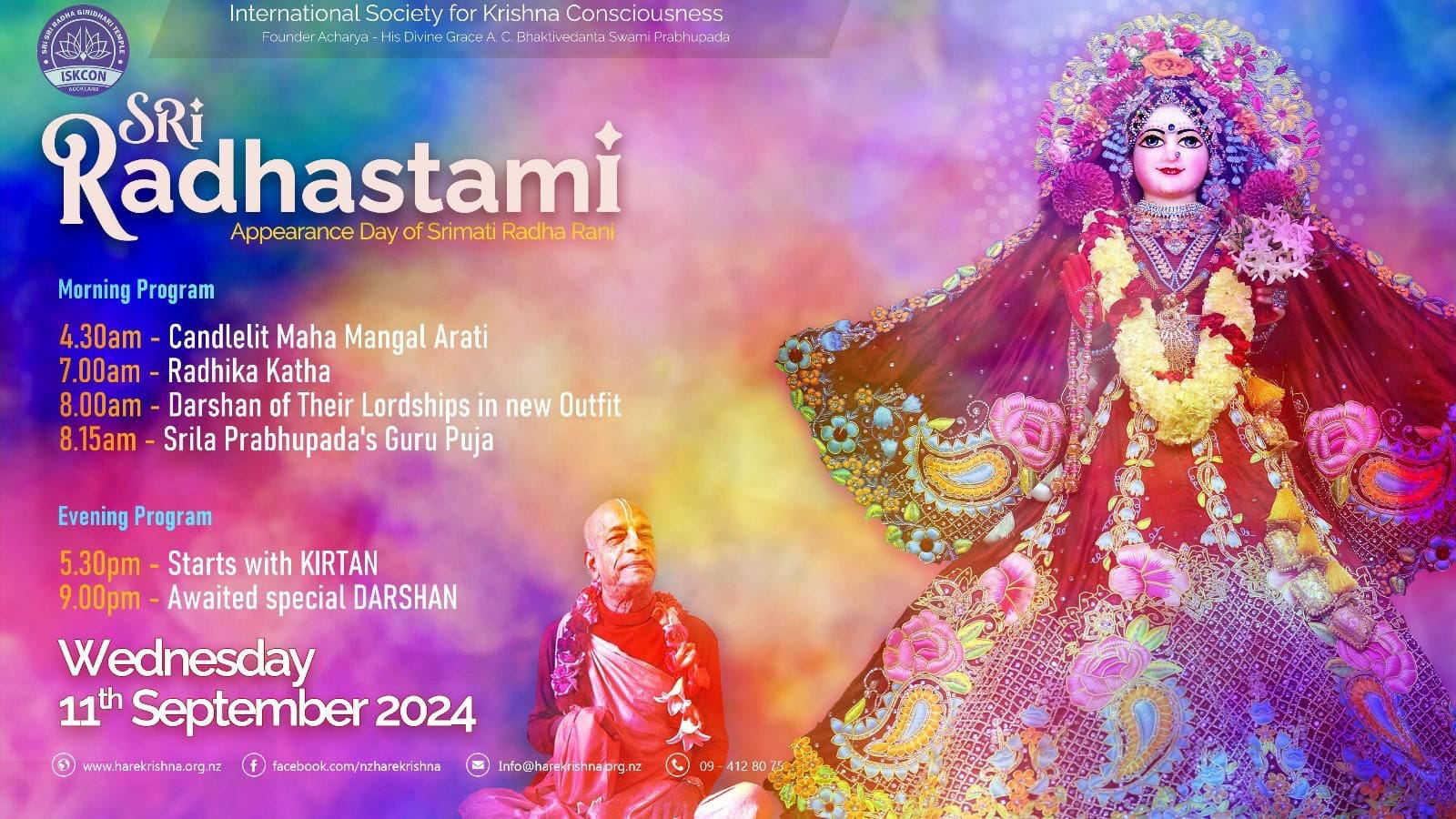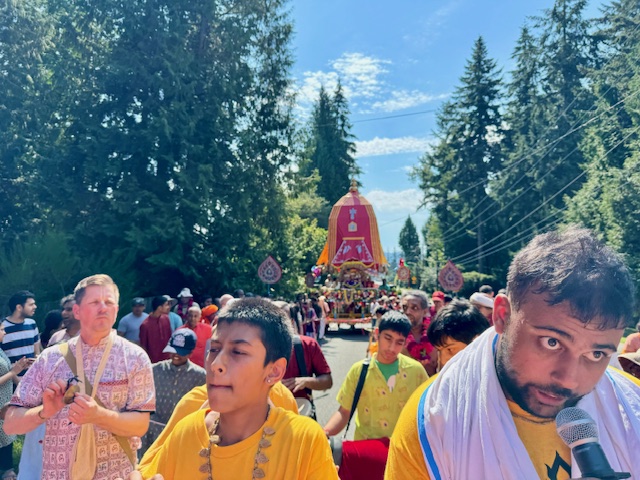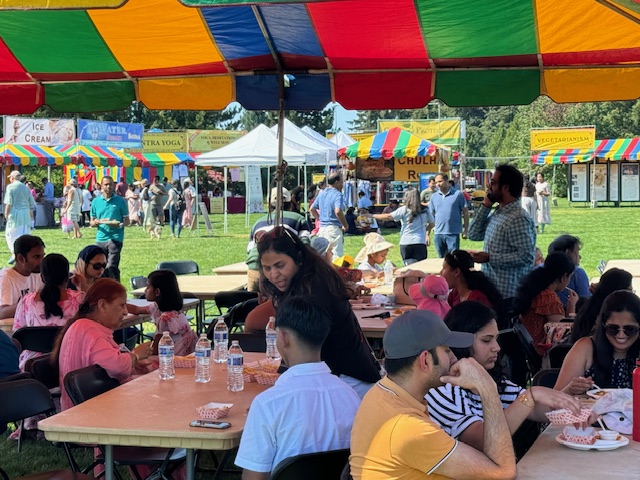Develop your personal relationship with Krishna (Uddipana explained) | Wisdom Munches 10
The Motivation-Morality quadrant: Understanding 4 kinds of people | Wisdom Munches 9
→ The Spiritual Scientist
Why is Lord Jagannatha’s form so unusual? | Wisdom Munches 8 | Chaitanya Charan
→ The Spiritual Scientist
Does God ever stop loving us? | Wisdom Munches 7 | Chaitanya Charan
→ The Spiritual Scientist
Does Bhagavad-gita teach Advaitavada? | Wisdom Munches 6 | Chaitanya Charan
→ The Spiritual Scientist
Does devotion provide a licence for wrongdoing? | Wisdom Munches-5 | Chaitanya Charan
→ The Spiritual Scientist
I am a fallen soul | Wisdom Munches 4 | Chaitanya Charan
→ The Spiritual Scientist
Sri Radhastami 2024
→ Hare Krishna Auckland

Join us in celebrating Sri Radhastami on Wednesday 11th September 2024 at Sri Sri Radha Giridhari Temple.

India Lost World Cup Wisdom Munches 3 Chaitanya Charan
→ The Spiritual Scientist
46th Disappearance Day Offering of Shrila Prabhupada | ISKCON Melbourne | Chaitanya Charan
→ The Spiritual Scientist
Seattle Rathayatra Parade
→ Ramai Swami


The Seattle Rathayatra was held on the second day of the festival and started a few kilometers from the park. Their Lordships, Sri Jagannatha, Baladeva and Subhadra rode majestically on Their chariot through the streets for two hours until They came back.
There was also a smaller Rathayatra cart in front and the kirtan was led by devotee children between ten and fifteen years of age. I started off the kirtan in front of the bigger cart and other devotees took over.
When Their Lordships were brought into the park I performed an arati ceremony and gave out maha-prasadam afterwards. Kirtana, dance and drama followed through the day and everyone was very ecstatic.


Vaishnava Organizations in the UK Gather to Glorify Srila Bhaktisiddhanta Sarasvati Thakura
→ ISKCON News
ISKCON’s Bhaktivedanta Manor’s Temple President Visakha Dasi on stage with other Vaishnava representatives. Devotees from ISKCON Bhaktivedanta Manor participated in a special event in observance of the 150th anniversary of the birth of His Divine Grace Srila Bhaktisiddhanta Sarasvati Thakura. The event, hosted by the Gaudiya Mission at the Harrow Leisure Centre, brought together representatives […]
The post Vaishnava Organizations in the UK Gather to Glorify Srila Bhaktisiddhanta Sarasvati Thakura appeared first on ISKCON News.
Exploring a Devotee’s Mission to Preserve the Cultural Heritage of ISKCON
→ ISKCON News
Devotees in Vancouver perform the story of Indra cursed to be a pig. Radha Damodar Dasa, a disciple of Srila Prabhupada, has been a dedicated servant of ISKCON for over five decades. His journey within the Krishna Consciousness movement includes the significant effort of preserving 1,684 play scripts, which are not just text on a […]
The post Exploring a Devotee’s Mission to Preserve the Cultural Heritage of ISKCON appeared first on ISKCON News.
How Can I Serve You? | Wisdom Munches -2 | Chaitanya Charan
→ The Spiritual Scientist
God goes with people to Hell | Wisdom to ACT-1 | Chaitanya Charan
→ The Spiritual Scientist
Vyas Puja becomes Vipralambh Sewa
→ Dandavats
Read More...
Antya 9.27-44 Lord Chaitanya stresses sannyasis noninvolvement in financial matters- Chaitanya Char
→ The Spiritual Scientist
Antya 9.13-26 Provoking powerful people over their peculiarities is perilous – Chaitanya Charitamrit
→ The Spiritual Scientist
Antya 9.1-12 How beholding Lord Chaitanya filled people with ecstasy – Chaitanya Charitamrita study
→ The Spiritual Scientist
Inner transformation – from wild forest to agricultural field to Vrindavan | Bhagavatam 10.63.26
→ The Spiritual Scientist
Things that are worth doing, are worth doing well — and worth doing badly too Gita 06.26
→ The Spiritual Scientist
The more we watch the mind’s movie, the more the mind makes our life a horror movie Gita 06.06
→ The Spiritual Scientist
Even if we can’t flatten the pandemic curve, we can flatten the panic curve Gita 18.35
→ The Spiritual Scientist
Even though we have more enemies than we realize, we also have more friends than we realize BG 10.10
→ The Spiritual Scientist
The more we consider others’ need, the more we can free ourselves from our greed Gita 05.21
→ The Spiritual Scientist
Even if our consciousness can’t be elevated, it can still be expanded Gita 02.13
→ The Spiritual Scientist
As long as we lack purity, we live in poverty, no matter how much money we have Gita 14.12
→ The Spiritual Scientist
Appreciating our spiritual identity can anchor us amid the turbulence of contemporary society 02.16
→ The Spiritual Scientist
Respond to moral failure not by mental punishment but by spiritual reinstatement Gita 09.30
→ The Spiritual Scientist
By overemphasizing identity, identity politics ends up obscuring identity Gita 02.13
→ The Spiritual Scientist
Without spiritual direction, religious regulation seems to be like pointless restriction or even pai
→ The Spiritual Scientist
Bhagavad Gita Overview Chapter 8
→ The Spiritual Scientist
Inauguration Of Sridham Mayapur Board of Education
→ Mayapur.com
ISKCON Environmental Initiative Invites Devotees to Participate in World Cleanup Day
→ ISKCON News
World Cleanup Day, a global event aimed at combating litter and waste pollution, is a cause that resonates deeply with ISKCON’s values of environmental stewardship. The ISKCON Environmental Initiative (IEI) is calling on our temples, congregation members, temple devotees, youth groups, and nama hatta groups worldwide to participate according to their capacity, reinforcing our shared […]
The post ISKCON Environmental Initiative Invites Devotees to Participate in World Cleanup Day appeared first on ISKCON News.
2024 Pan-African Vyasa-puja Book Now Available for Download
→ ISKCON News
The Bhaktivedanta Book Trust Africa (BBTA) has once again honored the legacy of His Divine Grace A.C. Bhaktivedanta Swami Prabhupada with the release of the 2024 Pan-African Vyasa-puja book. This annual offering, now available for free download on the Bhaktivedanta Book Trust-Africa (BBTA) website, provides a platform for devotees, friends, and well-wishers across the African […]
The post 2024 Pan-African Vyasa-puja Book Now Available for Download appeared first on ISKCON News.
Seattle Rathayatra Festival
→ Ramai Swami


Each year I try to come for the Seattle Rathayatra, which goes over two days during the Labor Day long weekend. The first day started at a local park where devotees and guests came with their families.
As you can see in the pictures, there were stalls with free prasadam, snacks, books, kirtan and drama stage, and many others. A favorite attraction were the areas with calves and goats from one of our nearby farms. Their Lordships, Jagannatha, Baladeva and Subhadra sat on a beautiful swing.


A Dream Fulfilled: The Majestic Unveiling of ISKCON Raipur’s New Temple
→ ISKCON News
The auspicious inauguration of ISKCON Raipur was held from August 17-19, 2024. The special grand installation ceremony of the Deities, Sri Sri Radha Rasabihari, took place on August 19th on the occasion of Balaram Jayanti, Lord Balarama’s Appearance Day. Raipur, the capital city of Chhattisgarh, is a vibrant and rapidly growing metropolis in central India. […]
The post A Dream Fulfilled: The Majestic Unveiling of ISKCON Raipur’s New Temple appeared first on ISKCON News.
2024 BeatlesFest Speech
→ Dandavats
Read More...